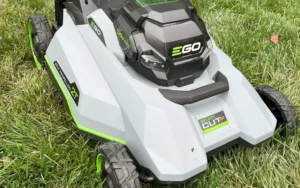In the world of lawn care, battery-powered mowers have emerged as a game-changer. Whether you’re contemplating an upgrade from your traditional gas mower or are new to lawn maintenance, this guide will help you navigate the advantages and disadvantages of battery-powered options.
Modern Convenience: The Appeal of Battery Mowers
Gone are the days when the whirring of a gas-powered lawn mower was the only option for keeping your lawn neat. Today, battery-powered mowers offer an inviting blend of simplicity, ease of use, and environmental benefits.
Pros of Battery Mowers: Redefining Ease of Use
Simple Operation
One of the highlights of battery mowers is their straightforward functionality. Forget about pulling cords or fiddling with spark plugs. A simple one-touch start button and ergonomic design make mowing a breeze.
Quiet Performance
An added benefit is that these mowers are remarkably quiet. Your weekend lawn care routine can now happen without the worry of disturbing neighbors or ruining your peaceful morning.
Low Maintenance
One of the most compelling features is the low upkeep. There’s no need to change the oil, replace spark plugs, or tinker with air filters, freeing up your time for other activities.
Longer-Term Savings
Although the initial investment can be higher, you’ll likely find that battery mowers pay off in the long run by eliminating ongoing fuel costs and reducing maintenance expenses.
Emission-Free Operation
 The green quotient of battery mowers is hard to ignore. With zero emissions, they provide an eco-friendly solution that supports both your lawn’s health and the planet’s.
The green quotient of battery mowers is hard to ignore. With zero emissions, they provide an eco-friendly solution that supports both your lawn’s health and the planet’s.
Cons of Battery Mowers: Points to Consider
Limited Run Time
One limitation to be aware of is the battery life. For larger lawns, you might need to plan around charging times or consider having an extra battery.
Initial Costs
The upfront costs are generally higher than those of a traditional mower, though this is often offset by the long-term savings in fuel and maintenance.
Charging Time
Be mindful that you’ll need to account for charging time, so planning your lawn care activities becomes a bit more crucial.
The Technological Advancements: Making Battery Mowers Better
Early models of battery-powered mowers had their shortcomings, but advances in battery technology and electric motors have dramatically improved performance and reliability.
Battery Evolution
Lithium-ion batteries, commonly used in electric vehicles and smartphones, now power most modern battery mowers, offering longer runtimes and quicker charging cycles.
Improved Performance
Advancements in electric motors have made battery-powered mowers more powerful, capable of delivering a cut quality that rivals traditional mowers.
Is a Battery-Powered Mower Right for You?
Deciding on a battery-powered mower largely depends on your lawn’s size, your personal preferences, and your willingness to adapt to new technology. If you value ease of use, low maintenance, and the added benefit of quieter operation, a battery-powered mower could be a strong fit, even for those with larger lawns willing to work around the battery life.
Battery-powered mowers offer a modern and convenient approach to lawn care, backed by ever-advancing technology. Whether you prioritize simplicity or just want a quieter, easier-to-maintain machine, a battery-powered mower offers an appealing alternative to traditional options. Armed with this information, you’re well-equipped to decide if making the switch aligns with your lawn care objectives.
How to Choose the Right Battery-Powered Mower for You
As battery-powered mowers gain popularity, a wide array of options has flooded the market. Numerous manufacturers, including many well-known traditional brands, have stepped into the arena. Here’s a 4-point guide to help you make an informed choice:
1. Assess Your Lawn Size
Before making any decisions, consider the size of your lawn. Smaller to medium-sized lawns (up to 1/2 acre) can usually be managed with a single battery charge, while larger lawns might require extra batteries or models with longer runtimes.
2. Check Battery Specs
The type and capacity of the battery will impact both the mower’s performance and how often you’ll need to recharge. Look for lithium-ion batteries, which offer longer life and quicker charging times. Check the amp-hour (Ah) rating; higher numbers generally mean longer runtimes.
3. Examine the Features
Modern battery-powered mowers come with a range of features, including adjustable cutting heights, mulching options, and even smart capabilities like app integration for tracking usage and battery life. Decide which features are most important for your lawn care needs.
4. Consider Brand Reliability
As battery-powered mowers have gained traction, many traditional brands have entered the market alongside newcomers. If brand reputation and availability of replacement parts are important to you, you might opt for a well-known brand that has a history of reliable lawn care equipment.
Armed with these considerations, you’re better equipped to navigate the options and choose a battery-powered mower that aligns with your lawn care requirements.
Read battery-powered mower reviews here.

